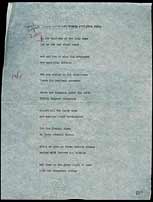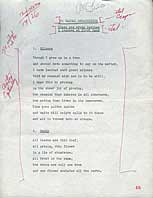 By 1961, Pablo Neruda had established himself as one of the most important and prolific Spanish-language writers of the twentieth century. His work had been translated into a dozen different languages, yet for most North Americans and other English-speaking peoples, Neruda was virtually unread and viewed more as a radical politician than South America’s most explosive poet. So when Ben Belitt, VQR’s self-proclaimed “hispanic Ear to the Ground,” sent a few translations of Neruda to the journal, Charlotte Kohler, the editor at the time, quickly accepted.
By 1961, Pablo Neruda had established himself as one of the most important and prolific Spanish-language writers of the twentieth century. His work had been translated into a dozen different languages, yet for most North Americans and other English-speaking peoples, Neruda was virtually unread and viewed more as a radical politician than South America’s most explosive poet. So when Ben Belitt, VQR’s self-proclaimed “hispanic Ear to the Ground,” sent a few translations of Neruda to the journal, Charlotte Kohler, the editor at the time, quickly accepted.
The poem Kohler chose, “Sonata with Some Pines,” was a longer piece taken from Neruda’s 1958 collection Estravagario, or Book of Vagaries, and the final poem in Belitt’s upcoming book Selected Poems of Pablo Neruda. It is a devastating piece, yet at the same time, strangely celebratory. This impassioned lyric moves from couplets riddled with haunting, destructive images like “let us finger the doomsday / that moved with us always” and “the sun tastes of salt / and the smell in the funeral seaweed / is of childbirth and charnel house” to small celebrations tinged with despair like “nothing has greatness but sea-spray / at eight in the morning” and finally “make earthy our calling / and touch earth with our spirits.” The poem offers a look at Neruda’s competing impulses: his passion for the infinite and the experiential, and his firm dedication to a “poetry of the impure.”
Belitt had been urging Grove Press to help him publish a substantial collection of Neruda’s work, ranging from 1925–1959, for quite some time. He told Kohler that “all came through in a rush a year or so ago: copyright permissions, my endorsement as translator by the poet, and a vein of translation which, I have learned, must be ‘taken at the flood’ or not at all.” He also mentions a sudden surge of interest in Neruda on the West Coast. With the poetry of Pablo Neruda picking up steam, VQR published “Sonata with Some Pines” in the Winter 1961 issue next to a few new translations of Baudelaire, emphasizing the journal’s dedication to expanding the American horizon of international literature.
It would be over a decade before VQR received another Neruda poem, but in early Spring 1971 Belitt sent Kohler a long sequence poem “V: Manual Metaphysics” from his third collection of Neruda translations New Poems (1968–1970), set for publication the following year. Belitt thought the poems presented “a Neruda nobody knows—miniature, lyrical, whimsical, elusive” and hoped VQR could use all, or at least a few of the poems.
Kohler decided to publish the entire sequence, and Belitt excitedly responded “the poems open and shut at a certain angle, like Venetian blinds; and nothing less than a sequence will do to pattern them properly.” He also noted that “this group of 11 are from part V (which is a kind of Ars Poetica) of Neruda’s valediction to the ’60’s — a big book full of ‘little’ poems apocalyptically called FIN DE MUNDO: World’s End, a kind of trial balance of a century and the personal vision of a lifetime.”
A few months later on December 10, 1971, Pablo Neruda was awarded the Nobel Prize in Literature. Belitt wrote Kohler: “What with the Nobel Award blowing up a storm from Sweden, you are doubtless as eager as I am to get the Neruda poems into print. . . . You must have had a pricking in your thumbs when you took them.” VQR published “V: Manual Metaphysics” the following year in its Spring 1972 issue while Neruda was still in Paris serving as a Chilean diplomat for the newly elected President Allende.
Neruda died of heart failure the following year, twelve days after the Chilean presidential coup by Pinochet. By then, he was considered the “most volatile talent in Spanish” and his reputation has never diminished since. The importance of publishing such a poet in English, even late in his career, cannot be overstated. VQR and a few other prominent journals and magazines such as Poetry, The Nation, and The New Yorker, managed to thrust the passionate poems of a radical and protean South American poet into the American consciousness. Pablo Neruda gave America what it desperately needed in the midst of one of the most chaotic and tumultuous decades in American history: a large vision in a crumbling world.
Presented here exclusively are Ben Belitt’s original typescripts of Neruda’s poems “Sonata with Some Pines” and “V: Manual Metaphysics.”
 |
 |
| Typescript of “Sonata with Some Pines” | Typescript of “V: Manual Metaphysics” |






